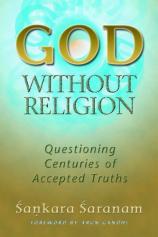Reading Group Guide
Discussion Questions
God Without Religion: Questioning Centuries of Accepted Truths

1. What is your understanding of god without religion? How is it possible to seek God outside the dictates of a church, mosque, or temple? What might change in the world if organized religion disappeared?
2. What is the difference between religion and spirituality? Do you consider yourself religious, spiritual, agnostic, or atheist? How did reading God Without Religion alter your perception of religion and spirituality?
3. Saranam advocates open-ended questioning as an approach to spiritual growth, beginning with the question "What is God?" What else might be gained from this form of worship? How is your view of yourself, other people, and the world reflected in your definition of God?
4. Saranam claims that New Age spiritual movements can be as dogmatic as organized religions. How is it possible to tell if you are being subjected to modern-day dogma espoused by a "spiritual master?" Do you think people can seek an Absolute free of any association with a teacher or group?
5. God Without Religion introduces seventeen techniques for spiritual growth. How are these techniques different from the practices of organized religions? How can the practice of accessing intuition free an individual to develop a direct understanding of God?
6. Choose one of the seventeen techniques to practice every day for a week, then ask yourself these questions: How did it affect me? What does it mean to be awakened intuitively, and how might I incorporate this new awareness into my everyday life?
7. Saranam argues that belief in religious miracles stifles the pursuit of knowledge, saying, "While human experiences viewed as miracles can furnish a sense of safety and security, these experiences, contrary to religion's claims, cannot validate a god's power. All they can do is confirm beliefs we already harbor" [p. 30]. How does this argument undermine ideas proposed by religious texts? What might happen if people stopped believing in miracles such as the crossing of the Red Sea during the exodus from Egypt, the virgin birth, or the Resurrection?
8. In Chapter Two, Saranam introduces the Cycle Theory of history. Do you consider it a satisfactory explanation for historical events? How does your worldview change while imagining history as cyclical rather than linear?
9. How does the theory of self add to an understanding of human psychology, social systems, and morality? How might an expansive sense of self lead to a universal spirituality?
10. In Technique 8, Saranam introduces the idea of commonsense asceticism as a way to turn the senses inward. Do you think this is feasible for most people? How would adhering to commonsense asceticism shift the sense of self?
11. Saranam calls pranayama, or energy control through sense introversion, "a scientific approach to life and truth seeking." How does it connect science and spirituality? How does sense introversion fit in with the larger dialogue about science and spirituality?
12. Saranam says, "The relationship between ethics and organized religions is precarious. On the one hand, organized religions are often considered the root of moral behavior, while on the other hand they distort morality" [p. 161]. What might happen if people took back the externalization of morality? What might constitute a morality devoid of empty promises about the future? Explore an instance when your inner sense of ethics told you your behavior was just or unjust.
13. Saranam explains how mysticism underlies all religions. If this is the case, what underlies mysticism? How can mysticism promise "a more intimate knowledge of God?" [p. 215]
14. Saranam encourages spiritual investigators to "celebrate apostasy" by communicating their religious renunciation openly with family and friends. Do you think encouraging people to question their religion can lead them to develop a more personal connection with God? Try instigating a conversation about God with someone close to you. What comes up for you?
15. What would a world without religion be like? Imagine how people could build community by engaging in spiritual colloquia, as Saranam suggests. What could replace the rituals and holidays people are attached to? How might people come together to celebrate without excluding others?
God Without Religion: Questioning Centuries of Accepted Truths
- Publication Date: June 1, 2005
- Genres: Christian, Philosophy
- Hardcover: 320 pages
- Publisher: Pranayama Institute
- ISBN-10: 0972445013
- ISBN-13: 9780972445016







